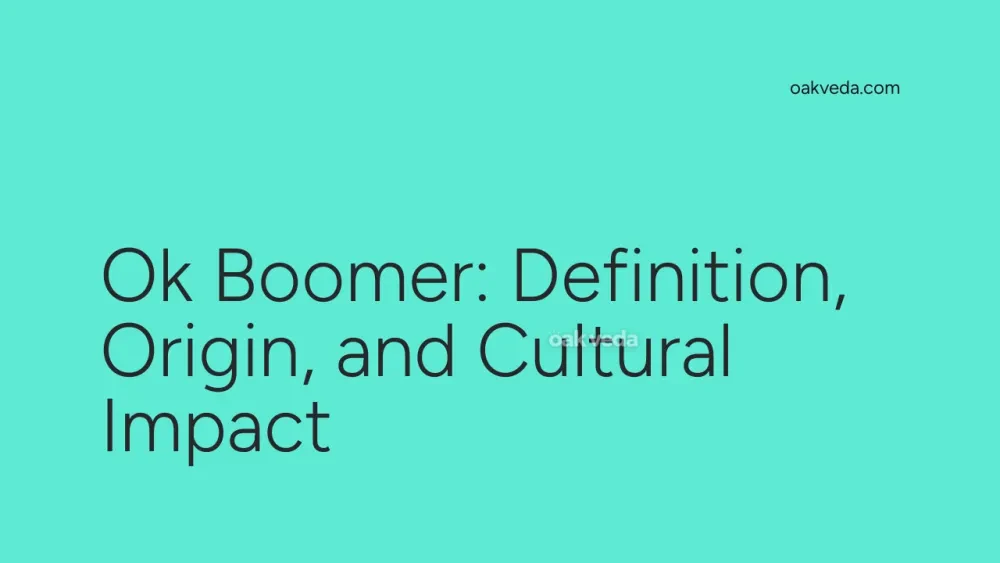
What is "Ok Boomer"?
"Ok Boomer" is a viral catchphrase that gained widespread popularity on social media platforms in 2019. It's typically used as a dismissive or sarcastic response to opinions or comments perceived as outdated, close-minded, or resistant to change, often associated with the Baby Boomer generation. The phrase encapsulates the frustration of younger generations towards older individuals who they feel are out of touch with modern issues and attitudes.
Origin and Development of "Ok Boomer"
The exact origin of "Ok Boomer" is difficult to pinpoint, but its usage began to surge in 2019. The phrase gained momentum on TikTok, where young users would respond to videos featuring older individuals expressing conservative or outdated viewpoints with "Ok Boomer" comments or video responses. From there, it quickly spread to other social media platforms like Twitter, Instagram, and Facebook.
How "Ok Boomer" Works
"Ok Boomer" functions as a linguistic shortcut to express disagreement or dismissal without engaging in a lengthy debate. It's often used in the following contexts:
- As a response to perceived generational stereotypes
- To challenge outdated views on social issues
- In discussions about climate change, technology, or economic policies
- As a way to shut down conversations deemed unproductive
The phrase's power lies in its brevity and the implied generational divide it represents.
Popular Examples of "Ok Boomer"
Some notable examples of "Ok Boomer" in popular culture include:
- A New Zealand politician using it in parliament to dismiss a heckler
- Merchandise featuring the phrase, from t-shirts to phone cases
- Memes and GIFs across various social media platforms
- Its inclusion in the New York Times crossword puzzle
Impact of "Ok Boomer" on Social Media Culture
"Ok Boomer" has had a significant impact on social media culture:
- Generational discourse: It has sparked conversations about intergenerational communication and understanding.
- Meme culture: The phrase quickly became a meme, demonstrating the rapid spread of ideas on social media.
- Political expression: Young people have used it to voice frustration with political and social systems.
- Language evolution: It showcases how language adapts and evolves in the digital age.
Controversies Surrounding "Ok Boomer"
The phrase has not been without controversy:
- Ageism accusations: Some argue that "Ok Boomer" is ageist and promotes negative stereotypes about older generations.
- Workplace concerns: There have been discussions about whether using the phrase could constitute age discrimination in professional settings.
- Generational divide: Critics argue it deepens the generational divide rather than promoting understanding.
- Overuse and commercialization: As with many viral phenomena, some feel the phrase has been overused and co-opted by brands, diluting its original meaning.
How Brands and Influencers Use "Ok Boomer"
Despite the controversies, many brands and influencers have incorporated "Ok Boomer" into their marketing strategies:
- Social media campaigns: Using the phrase to appear trendy and in touch with younger audiences
- Product marketing: Creating merchandise featuring the slogan
- Content creation: Developing "Ok Boomer" themed content for engagement
- Influencer partnerships: Collaborating with influencers to create "Ok Boomer" related content
However, brands must tread carefully to avoid appearing insensitive or alienating older consumers.
Future Trends Related to "Ok Boomer"
As with many internet phenomena, the popularity of "Ok Boomer" has waned since its peak. However, its impact on intergenerational dialogue continues:
- Evolving language: New phrases may emerge to express similar sentiments
- Generational awareness: Increased focus on understanding and bridging generational gaps
- Digital literacy: Greater emphasis on helping older generations navigate digital spaces
- Inclusive communication: Efforts to promote more inclusive and respectful intergenerational communication
FAQs about "Ok Boomer"
-
Is saying "Ok Boomer" considered ageist? While some consider it ageist, others argue it's a response to perceived ageism from older generations. Context and intent matter.
-
Can using "Ok Boomer" get you in trouble at work? It's best to avoid using the phrase in professional settings, as it could be seen as disrespectful or even discriminatory.
-
Is "Ok Boomer" only used against Baby Boomers? While it references Baby Boomers, it's often used more broadly against anyone perceived as having outdated or close-minded views, regardless of age.
-
Has "Ok Boomer" lost its impact? Like many viral phrases, its usage has decreased over time, but it remains a recognized cultural reference.
-
Are there any positive outcomes from the "Ok Boomer" phenomenon? It has sparked important conversations about generational differences and the need for better intergenerational understanding and communication.
In conclusion, "Ok Boomer" represents more than just a viral phrase; it's a cultural touchstone that highlights the complexities of intergenerational communication in the digital age. While its popularity may have peaked, its impact on social discourse and online culture continues to resonate, reminding us of the power of language in shaping our social interactions and perceptions.
You may be interested in:
- Carousel Ads: Definition, Origin, and Impact on Social Media
- Brand Authenticity: Definition, Origin, and Impact
- POV Video: Definition, Origin, and Impact on Social Media
- Sleep On: Definition, Origin, and Impact on Social Media
- Hoo.be: Definition, Origin, and Impact on Creator Marketing
- Big Yikes: Definition, Origin, and Impact on Social Media

